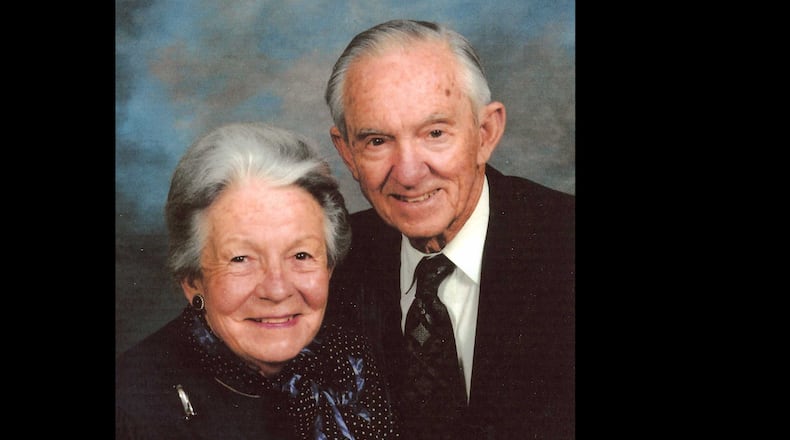Don Carter found more than interesting stories as a reporter at The Atlanta Journal in the early 1940s.
He found love.
Carter and Carolyn McKenzie, a reporter with the rival Atlanta Constitution, both drew assignments to cover the 4-H cattle show.
McKenzie pushed her byline and prose to Page 1 with some striking photos she took.
Carter’s picture-less piece landed in the back pages of the Journal, and he ended up in the editor’s office.
“His editor called him in and said, “You let this girl beat you on this story,” said Carrol Dadisman, a retired journalist and Carter’s longtime friend and protégé.
Carter, a cousin of former President Jimmy Carter, and McKenzie were married for more than 60 years (before her death in 2010).
He also was true to journalism, rising to vice president of the Knight-Ridder newspaper chain and serving for years as board member for The Red & Black, the daily newspaper at the University of Georgia, his alma mater.
“He loved journalism. He loved newspapers,” Dadisman said. “He came out of an era when the very strong emphasis was on objective and unbiased reporting.”
Don Carter, career newspaperman and resident of Sea Island, died of complications from a fall on Wednesday, three months shy of his 100th birthday.
President Jimmy Carter said, “Rosalynn and I mourn the loss of my cousin and lifelong friend Don Carter. Don and I grew up together in Plains, and he supported me throughout my political career. He will be remembered not only as a superb journalist and newspaper executive, but as an advocate for the important role that journalists play in our democracy.”
Don Carter graduated from UGA in 1938 and began his career at The Atlanta Journal, initially covering the farm beat, which was big in the then largely agricultural state.
In 1942, he left the paper for service in the U.S. Army in China and other theaters. Later that year, while stationed in New Jersey, he married Carolyn.
He was back at the paper after the war and moved into management as the Journal’s city editor. He returned to his alma mater while city editor, recruiting journalism students for internships and permanent jobs at the newspaper.
In 1958, Dow-Jones created the Newspaper Fund, offering fellowships to high school journalism teachers, later also providing money for newspaper internships. Carter was hired as the fund’s first director, a job he held from 1959 to 1962.
Dow-Jones created The National Observer, a weekly newspaper reviewing and analyzing the week’s news, in 1962, and Carter and his wife moved to Washington so he could become its managing editor.
Newspaper leadership jobs followed at The Record in Hackensack, N.J., The Macon Telegraph and News and The Lexington (Ky.) Herald Leader.
In the late 1970s, Carter, a one-time president of the Associated Press Managing Editors organization, relocated to Miami to become vice president for news for Knight-Ridder. He retired from that job in 1982 at age 65.
Regardless of where work took Carter, he always knew he and his wife would eventually return to Georgia, Dadisman said.
The couple built a home on Jekyll Island. They later bought a beautiful lot on nearby Sea Island, which overlooked the inland waterway and “the marshes of Glynn,” Dadisman said.
They built a home on the lot in the 1970s and made it their permanent residence after Carter retired.
The Carters were charter members of Sea Island’s Ocean Forest Golf Club and very well known people in the Sea Island/St. Simons/Brunswick community, Dadisman said.
Throughout his career, Carter was successful as an educator as well as journalist, his longtime friend said.
“His extensive work with the Newspaper Fund, with journalism school accrediting committees, The Red & Black and (UGA’s) Grady College all speak to his devotion to creating and properly training new generations of journalists,” Dadisman said.
He said Carter was one of the most important figures in the history of the American Press Institute, which for many years was the premier mid-career education center for newspapers and newspaper staff members.”
“After attending one of the early API seminars, he became one of the institute’s most popular and effective discussion leaders. In 1978, when API honored the 22 persons who had led 25 or more three-hour seminar sessions, Don was the fourth most-frequent discussion leader with 70 seminars.”
When President Richard Nixon opened relations with China in the early 1970s, Carter was invited to be part of the first trip there by journalists, Dadisman said.
Carter was a hard-nosed editor and made clear his unhappiness when his high standards weren’t met; on the personal side, he was “a very caring” and “very considerate” person, Dadisman said.
Much of his estate is expected to go to journalism, he said.
A funeral service will be held at St. Simons First Presbyterian Church where Carter was a longtime member, Saturday at 11 a.m.
About the Author
The Latest
Featured


